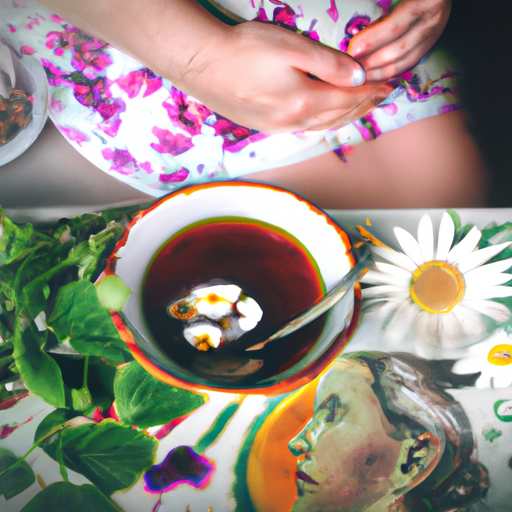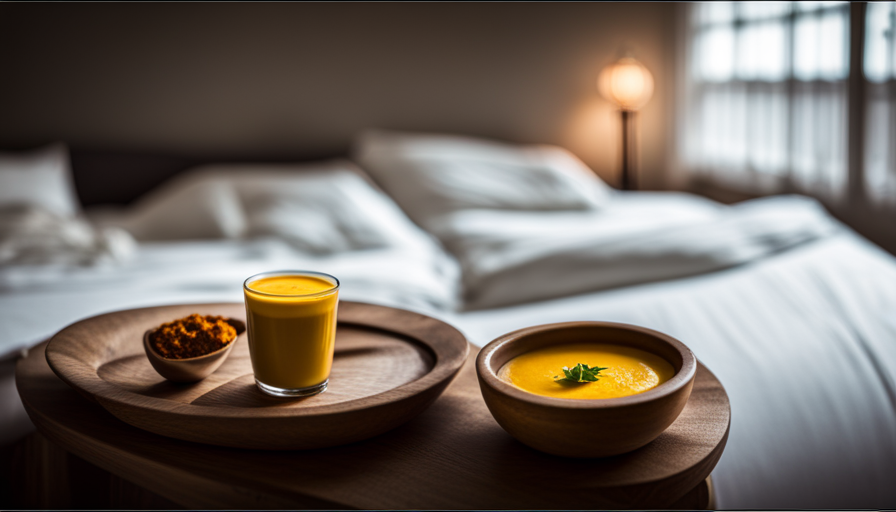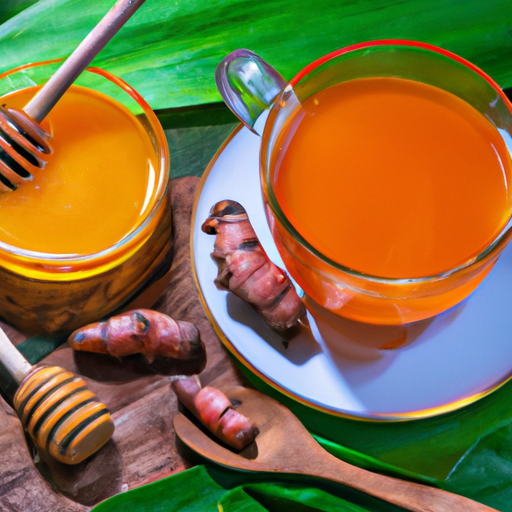During pregnancy, many women crave comforting beverages to accompany their journey filled with excitement and anticipation. It’s often said that choosing the right tea can feel as delicate as walking on eggshells.
But fear not, for I am here to guide you through the vast ocean of tea choices and reveal which ones are safe for you and your precious baby.
When it comes to tea during pregnancy, it is crucial to prioritize safety and well-being. In this informative article, we will explore the world of teas, focusing on those that have been deemed safe by experts.
From soothing herbal blends to the invigorating goodness of green tea, we will delve into the benefits and potential risks associated with each variety.
However, it is important to note that caution should always prevail. While some teas offer tremendous health benefits, others may pose potential risks.
By arming yourself with knowledge and understanding, you can confidently savor a cup of tea, knowing that you are making a wise and informed choice for both you and your little one.
So, let’s embark on this tea-filled adventure together, ensuring a safe and delightful journey throughout your pregnancy.
Key Takeaways
- Herbal teas such as chamomile and peppermint are considered safe options during pregnancy when consumed in moderation.
- Rooibos tea is a favorable choice due to its lack of caffeine and rich antioxidants.
- Green tea can be enjoyed in moderation during pregnancy, but excessive consumption may increase the risk of miscarriage and preterm birth.
- Consultation with a healthcare professional is important before consuming any tea or herbal blend during pregnancy to ensure safety and avoid potential risks and complications.
Herbal Teas
If you’re looking for a comforting and caffeine-free option, herbal teas can be a delightful addition to your pregnancy journey. Herbal teas are made from various plants and botanicals, and they offer a range of flavors and potential health benefits.
When it comes to pregnancy, it’s important to choose herbal teas that are safe and beneficial for both you and your baby. Certain herbal teas, such as chamomile and peppermint, are generally considered safe during pregnancy when consumed in moderation. However, it’s always a good idea to consult with your healthcare provider before incorporating any new herbal teas into your routine. This will ensure that you’re making choices that align with your specific health needs.
Now, let’s explore the benefits of rooibos tea and why it can be a great option during pregnancy.
Rooibos Tea
Although commonly enjoyed as an herbal alternative, Rooibos Tea is a favorable choice for expectant mothers due to its lack of caffeine and rich antioxidants.
Rooibos tea, derived from the South African plant Aspalathus linearis, is caffeine-free, which makes it a safe option during pregnancy.
It contains various beneficial compounds, including polyphenols and flavonoids, which act as antioxidants to protect cells from damage.
These antioxidants may help reduce the risk of developing chronic diseases and support overall well-being.
Additionally, some studies suggest that rooibos tea may have positive effects on fertility by balancing hormones and improving reproductive health.
However, it’s important to note that more research is needed to fully understand these potential benefits.
As we move on to discussing green tea, another popular choice during pregnancy, we can explore its unique properties and considerations.
Green Tea
Green tea is a popular beverage that can be enjoyed in moderation during pregnancy. It contains lower levels of caffeine compared to other types of tea, making it a safer choice for expectant mothers.
Additionally, green tea is known for its potential health benefits, such as being rich in antioxidants and having anti-inflammatory properties.
However, it is important to consume green tea in moderation and consult with a healthcare professional to ensure it’s safe for individual circumstances.
Moderate Consumption
Enjoying tea in moderation during pregnancy can be a safe and comforting way to nurture yourself and your growing baby. Green tea, in particular, has been shown to have numerous health benefits due to its high levels of antioxidants. However, it is important to be aware of potential risks associated with excessive consumption.
Green tea contains caffeine, which in large amounts can increase the risk of miscarriage and preterm birth. It is recommended to limit your intake to no more than two cups per day to reduce these risks. Additionally, it is important to choose high-quality green tea that’s free from pesticides and other harmful substances.
Transitioning to the next section, it’s also worth noting that green tea generally has lower caffeine content compared to other types of tea.
Lower Caffeine Content
Lower caffeine content in green tea is believed by some to be a safer option for expectant mothers. While green tea does contain caffeine, it generally has lower levels compared to black tea or coffee. However, it is important to note that the exact caffeine content can vary depending on the brand and preparation method.
For those who are concerned about caffeine intake during pregnancy, decaffeinated options or caffeine-free alternatives are available. These teas go through a process to remove or reduce caffeine levels, making them a suitable choice for those looking to minimize their caffeine intake. It’s always advisable to consult with a healthcare professional before making any changes to your diet during pregnancy.
Transitioning into the subsequent section about health benefits, it’s important to consider the potential benefits of certain teas for expectant mothers.
Health Benefits
Pregnancy can be a time when expectant mothers want to explore the many health benefits that certain teas can offer. While it’s important to be cautious and consult with a healthcare provider, some teas have been found to have potential health benefits during pregnancy.
These benefits include helping with digestion, soothing nausea, providing antioxidants, promoting relaxation, and boosting the immune system. However, it’s crucial to be aware of potential health risks associated with certain teas, such as herbal teas that may contain ingredients like chamomile or licorice root that could be harmful in large quantities.
To ensure safety, it’s recommended to choose teas from reputable brands that specialize in pregnancy-safe blends. Transitioning into the subsequent section about black tea, it’s important to note that black tea contains higher levels of caffeine, which should be consumed in moderation during pregnancy.
Black Tea
When it comes to black tea during pregnancy, it’s important to practice moderate consumption. While black tea does contain caffeine, it’s generally safe to consume in moderation. However, it’s important to be mindful of the caffeine content and limit intake to avoid excessive consumption.
Additionally, black tea is known for its antioxidant properties, which can be beneficial during pregnancy. However, it’s always best to consult with a healthcare professional before making any changes to your diet during pregnancy.
Moderate Consumption
If you’re expecting, you’ll be pleasantly surprised to learn that enjoying a cup of tea in moderation can be a safe and delightful experience for you and your baby. Pregnancy tea benefits include hydration, relaxation, and potential relief from common pregnancy discomforts.
However, excessive consumption of black tea during pregnancy may have some risks, including increased risk of preterm birth and low birth weight. It’s important to remember that moderation is key when it comes to black tea or any other type of tea during pregnancy.
To ensure a safe experience, consider the following guidelines:
- Choose organic teas to avoid exposure to pesticides and chemicals.
- Opt for herbal teas specifically formulated for pregnancy, which often contain beneficial herbs like chamomile, ginger, or peppermint.
Moving forward, it’s important to consider the caffeine content in tea during pregnancy to make informed choices for both you and your baby.
Caffeine Content
To ensure a healthy experience, you should be aware of the caffeine content in your favorite beverage and make informed choices for both you and your baby. During pregnancy, it is generally recommended to limit caffeine intake to 200 milligrams per day. While some teas contain caffeine, there are decaffeinated options available that can be enjoyed without worrying about the effects of caffeine on your pregnancy. Decaffeinated teas are processed to remove most of the caffeine content, making them a safer choice. Additionally, there are alternatives to traditional tea that can be considered, such as herbal teas that are caffeine-free and offer various health benefits. These alternatives can provide a soothing and enjoyable experience without the potential risks associated with caffeine consumption. Transitioning into the next section, it is important to note that tea also possesses antioxidant properties that can be beneficial during pregnancy.
Antioxidant Properties
Tea has incredible antioxidant properties that can enhance your overall well-being and add a delightful touch to your daily routine. When it comes to pregnancy and tea, it’s important to consider the antioxidant content.
Antioxidants are substances that help protect your cells from damage caused by free radicals. During pregnancy, having a diet rich in antioxidants is beneficial as it can support a healthy immune system and reduce the risk of chronic diseases.
Here are three important things to know about pregnancy and antioxidants:
-
Boosting immune health: Antioxidants can strengthen your immune system, which is particularly important during pregnancy when your body is more vulnerable to infections.
-
Promoting fetal development: Antioxidants play a crucial role in protecting the developing fetus from oxidative stress, which can contribute to birth defects and developmental issues.
-
Reducing inflammation: Pregnancy can lead to increased inflammation in the body. Antioxidants help combat this inflammation and promote overall wellness.
Transitioning to the next section, white tea offers a range of benefits for expecting mothers.
White Tea
White tea, known for its delicate flavor and minimal processing, has been found to have higher levels of antioxidants compared to other types of tea. These antioxidants help to neutralize harmful free radicals in the body, which can potentially reduce the risk of chronic diseases.
However, when it comes to pregnancy, it’s important to exercise caution and moderation. While white tea is generally considered safe during pregnancy, it’s always best to consult with your healthcare provider before making any dietary changes. Some studies suggest that excessive consumption of white tea may interfere with the absorption of certain nutrients, so it’s important to consume it in moderation.
As we transition into the next section about herbal blends, it’s worth noting that herbal teas can offer a variety of flavors and potential benefits during pregnancy.
Herbal Blends
After exploring the safety of white tea during pregnancy, let’s now shift our focus to herbal blends. When it comes to herbal teas, they can be a comforting choice for many pregnant women. However, it’s important to exercise caution and be aware of potential safety concerns and side effects.
While herbal blends are often promoted for their soothing and therapeutic properties, not all ingredients are safe for pregnant women. Some herbs may have uterine-stimulating effects or contain substances that could be harmful to the developing fetus. It is crucial to consult with a healthcare provider before consuming any herbal blend during pregnancy, as they can provide personalized advice based on your specific situation.
Now, let’s delve into the cautions and considerations regarding tea consumption during pregnancy.
Cautions and Considerations
Be cautious and take into consideration the potential risks and complications associated with herbal blends while expecting, as they can have a significant impact on the well-being of your unborn child. It’s important to note that although herbal teas are often seen as a natural alternative to traditional tea, not all herbal blends are safe during pregnancy. Some herbal teas may contain ingredients that can be harmful to both you and your baby. It is essential to consult with your healthcare provider before consuming any herbal blends. To help you make an informed decision, here is a table outlining some common herbal teas and their potential risks during pregnancy:
| Herbal Tea | Potential Risks during Pregnancy |
|---|---|
| Peppermint | May cause heartburn |
| Chamomile | May stimulate uterine contractions |
| Ginger | May increase the risk of bleeding |
| Raspberry Leaf | May cause uterine contractions |
| Nettle | May cause an allergic reaction |
Remember, it’s always best to err on the side of caution and avoid consuming tea during pregnancy unless specifically recommended by your healthcare provider.
Frequently Asked Questions
Can I drink chamomile tea during pregnancy?
Yes, you can drink chamomile tea during pregnancy. Chamomile tea is one of the alternative herbal teas for relaxation during pregnancy. It may also help alleviate pregnancy-related discomforts such as nausea and insomnia.
Is it safe to consume peppermint tea while pregnant?
Peppermint tea can provide relief for digestion issues during pregnancy. However, it is important to consume it in moderation as excessive amounts may cause heartburn. Alternatives like ginger or chamomile tea can also soothe pregnancy discomforts.
What are the potential risks of drinking hibiscus tea during pregnancy?
Drinking hibiscus tea during pregnancy may have potential risks, such as lowering blood pressure and causing uterine contractions. It’s recommended to avoid hibiscus tea and opt for safer alternatives like ginger or chamomile tea.
Can I have ginger tea while pregnant?
Sure, ginger tea during pregnancy can be a delightful and soothing option. It helps with morning sickness, aids digestion, and reduces inflammation. Check out some amazing ginger tea recipes for pregnant women to enjoy.
Are there any specific herbal blends that should be avoided during pregnancy?
During pregnancy, it is recommended to avoid herbal blends that contain certain ingredients like licorice root, chamomile, or peppermint. Caffeine-free alternatives to herbal tea include rooibos tea, chamomile tea, and ginger tea. Red raspberry leaf tea is believed to have benefits like toning the uterus and aiding in labor, but evidence is limited. It is important to consult with a healthcare provider before consuming any herbal tea during pregnancy.
Conclusion
In conclusion, when it comes to choosing a safe tea during pregnancy, it’s important to be cautious and informed. Herbal teas like peppermint and ginger can provide soothing benefits without any known risks.
Rooibos tea is another excellent choice due to its caffeine-free nature and high antioxidant content.
Green tea, black tea, and white tea can also be consumed in moderation, as they contain lower amounts of caffeine.
However, it’s always best to consult with your healthcare provider to ensure the safety and well-being of both you and your baby.
Remember, a wise choice in tea can be a comforting companion on your journey to motherhood.










